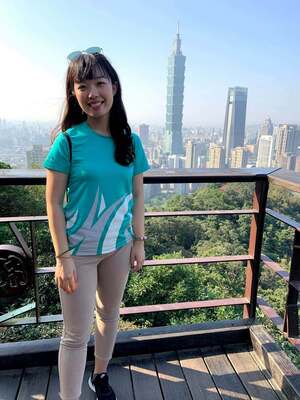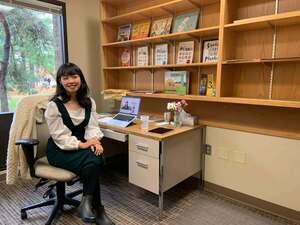Taiwan boasts a rich culture and picturesque scenery unlike any place in the world, offering a unique blend of indigenous, Chinese, and Japanese influences that is evident in its architecture, cuisine, and traditions. From the vibrant night markets and bustling shopping districts in Taipei and Kaohsiung, to the stunning peaks of the Alishan and Taroko National Parks, to the pristine shores of Kenting and the Penghu Islands, Taiwan's diversity can cater to the interests of all. It is this distinctive tapestry of culture that our Chinese FLTA Cin-Hua Chen calls home.

Cin-Hua’s teaching journey first began when she was 18 and worked part time at a “cram school”, helping students prepare for upcoming exams. Upon reflection on this experience, Cin-Hua stated that it initially pushed her away from the field of teaching. Much of what she was helping students with focused on the acquisition of as much knowledge as possible, but there was almost no explanation as to why students should learn. Without a deeper motivation than a cursory desire for knowledge, Cin-Hua feared she would quickly burn out.
Cin-Hua then enrolled at the National Taipei University of Education to study modern literature. Based on her past experience, she had no intention to pursue teaching. However, during her second year, she was required to choose a specialty for her major. A friend in her program was interested in teaching Chinese, and despite the initial hesitation, Cin-Hua was convinced to join. The classes she took about teaching methods were a surprise and a stark contrast to her experience teaching in the cram school. Courses focused on creating an immersive Chinese environment, avoiding the use of English altogether, and encouraging students to meaningfully engage with the course content rather than rewarding rote memorization. While in college, Cin-Hua also began teaching remedial Chinese–her classes were designed to support students that were falling behind in other classes and immigrants that needed supplemental language help. She found that teaching a younger audience was complicated in many ways that she did not expect. While the challenge kept the job interesting, she found that she missed the rigorous conversations of higher level language classes. Up to that point, Cin-Hua’s teaching experiences had seemed to be missing something. That is, until she received a letter at the end of the year from one of her students that said, “Thank you for teaching me and trying to understand me.” At that moment, something clicked for Cin-Hua. The “why” that she had been searching for at the onset of teaching became clear: a lifetime of teaching meant dedicating herself to understanding others and helping others to understand the world around them.
During the summer of Cin-Hua’s junior year, she interned in San Francisco for a Chinese immersion program, where she lived with a host family and taught Chinese. She found that the US education system allowed for much more flexibility and allowed teachers to personalize their lessons to the needs of their different classrooms. It seemed encouraged not just to make personal connections with students, but to do so with the intention of understanding each student’s learning style and motivation. This was Cin-Hua’s first time in the US, and after completing her time here, she knew that she wanted to return.
Upon returning to Taiwan and graduating college, Cin-Hua began graduate school at National Taiwan Normal University to study teaching Chinese as a second language. During her program, the Fulbright program advertised at her university and the FLTA program caught her eye. She spent two years perfecting her application and getting the required TOEFL scores before being accepted and placed in South Bend.

Now at Notre Dame, Cin-Hua works as a TA in various Chinese language and calligraphy classes, assisting in the classroom, grading assignments, and doing one-on-one conversational practice with students. In addition to teaching, she has taken classes in the philosophy and anthropology departments. Outside of the classroom, Cin-Hua is a regular at the various fitness classes offered by RecSports, using the change of scenery of moving to the US as a battery to jumpstart new self-care habits.
As a bilingual language teacher, Cin-Hua also reflected on the process of learning a language. Rather frankly, she stated, “the struggle is real.” By being not only a language teacher, but also a language learner, she understands the difficulties that her students face and emphasizes that those feeling discouraged are not alone. Learning a language is bound to incur frustration, but the key to mastery is to stay consistent over years of studying and understanding one’s own motivations for doing so. While learning a new language is a uniquely challenging journey, there is nothing on the path that cannot be overcome with enough perseverance.
About the CSLC
The CSLC is dedicated to the advancement of linguistic proficiency and cultural awareness for students, staff, faculty, and spouses in all languages across the Notre Dame community. If you would like to learn more about studying languages and cultures, Fulbright programs for Notre Dame Students, or cultural events sponsored by the many groups at Notre Dame, visit the CSLC website, or call (574) 631-5881.